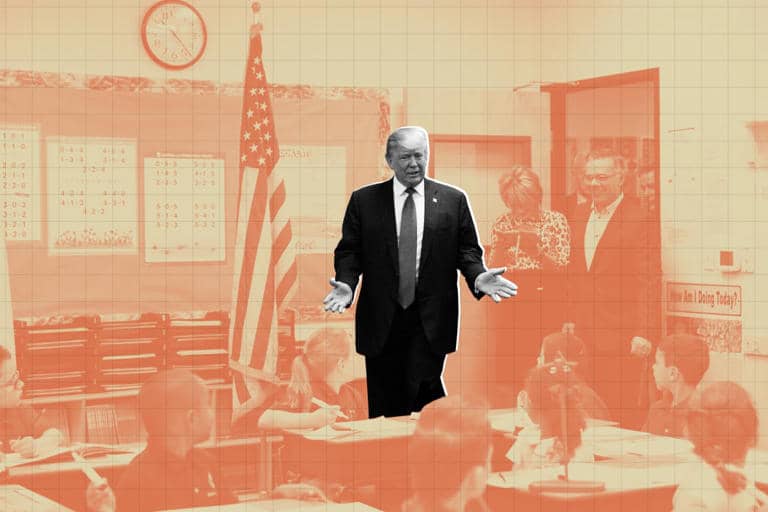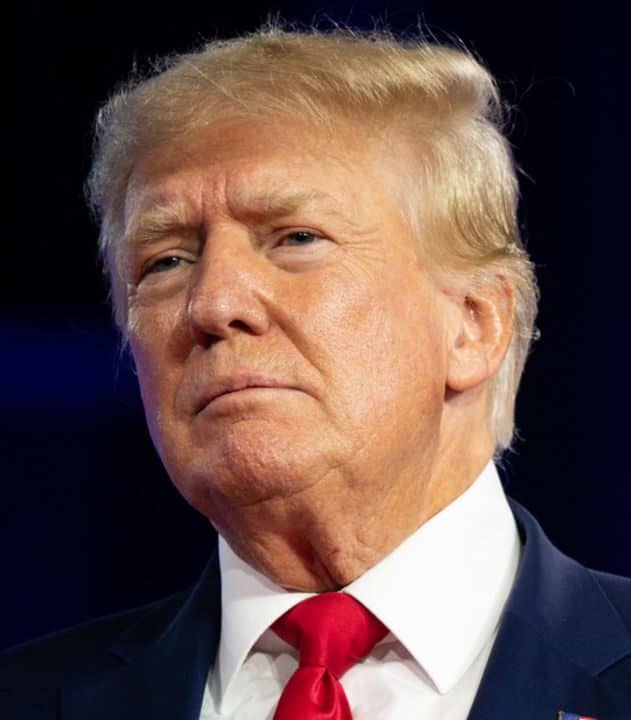♥”Trump’s Bold Plan: Overhauling Education to Combat ‘Wokeness’”
Introduction: The Return of Trump’s Education Vision
Donald Trump is back in the headlines, and this time he’s not just focusing on his political comeback but also on a sweeping overhaul of the American education system. With increasing discourse around the term “wokeness” and its supposed influence on educational curricula, Trump has positioned himself as a crusader against what he describes as left-leaning ideology pervading schools. Trump’s proposed reforms aim to reintroduce what he calls “patriotic education” and to eliminate teachings he considers divisive, such as critical race theory (CRT).
In this article, we’ll dive deep into Trump’s educational vision, exploring how it aligns with his base, what his critics say, and how this proposed overhaul could reshape the educational landscape in the United States.
Education in America has always been a reflection of the nation’s values, but it has also become one of its most heated battlegrounds. Former President Donald Trump has positioned himself firmly on one side of this battle, proposing a significant education reform aimed at reducing what he calls “woke ideologies” in classrooms. This latest focus represents not only his ongoing campaign strategy but also his vision of a redefined American identity—one that, he argues, is being compromised by progressive narratives and divisive teachings.
This article explores Trump’s proposed overhaul of the education system, looking at its potential impacts on students, educators, and society at large. With voices on both sides of the debate, the proposed changes are shaping up to be one of the most controversial education reforms in recent history.
What Is Trump’s Vision for Education?
A Call for “Patriotic Education”
Trump’s proposal for patriotic education focuses on instilling a sense of national pride and identity in American students. He argues that current curricula are too critical of the nation’s past, presenting it in a way that could lead students to feel ashamed rather than proud. According to Trump, education should instead celebrate America’s achievements and build pride among young citizens.
Supporters of Trump’s vision argue that children should grow up learning about the nation’s progress and strengths, viewing history as a way to inspire future achievements rather than focusing on past mistakes. His education agenda proposes to:
- Replace Critical Race Theory with a More Traditional Approach to History: Critical race theory, a legal framework examining systemic racism, has become a significant flashpoint in education. Trump’s policy aims to restrict CRT from schools, arguing it portrays the country as inherently racist.
- Reintroduce Civic Education as a Core Requirement: Trump also aims to reinforce civics education, focusing on traditional values, civic duties, and respect for law enforcement.
- Promote American Heroes and Events in the Curriculum: His education reform would highlight founding fathers, veterans, and key events that showcase the nation’s strength and resilience.
-

“Trump’s Education Overhaul: A Patriotic Revival or an Attack on Academic Freedom?”
Combatting “Woke Ideologies”
Trump’s education reform plans go beyond just patriotic education. He’s also targeting what he calls “woke ideologies” in schools, which he believes distort young people’s views on gender, race, and societal roles. The proposed reforms focus on rolling back lessons that promote gender fluidity, systemic bias, or social activism, which he claims are ideologically driven rather than educational.
Supporters argue that this would ensure classrooms focus on core subjects, limiting exposure to ideas they believe should be left out of school curricula. Detractors, however, see this as censorship and argue that students benefit from learning about diverse perspectives.
Also read: Trump Gears Up for Assault on Wokeness With Education Overhaul
Restoring National Pride Through Education
At the core of Trump’s education reform is what he terms “patriotic education”—a curriculum that would place a strong emphasis on America’s achievements, historic figures, and founding ideals. Trump argues that teaching American history with pride is essential for fostering unity, encouraging young people to view the United States as a beacon of opportunity rather than a flawed society.
In Trump’s view, recent educational trends have overemphasized America’s historical mistakes, leaving students with a skewed perspective on the nation’s past. He believes that the emphasis on slavery, inequality, and systemic issues has overshadowed American progress, fostering a sense of division rather than unity.
Critical Race Theory and “Woke Ideologies”
Trump’s proposal directly targets critical race theory (CRT) and other frameworks that examine social inequalities. CRT, which explores the role of systemic racism in American institutions, has become a flashpoint in recent years. Trump’s vision for education reform aims to prevent such teachings, arguing that they divide students by race and foster resentment rather than understanding.
Critics of CRT argue that it encourages students to see themselves primarily through the lens of race and identity, which can lead to a polarized view of society. Supporters, however, believe that CRT is crucial for understanding the roots of inequality and creating a more just society.
Why the Push Against “Wokeness”?
The Evolution of the “Woke” Debate
The term “woke” originally referred to being aware of social injustices, especially racial inequality. However, it has since evolved, becoming a catch-all term used by some to describe progressive, left-leaning ideologies in issues such as race, gender, and the environment. Trump and his supporters argue that wokeness has been weaponized in schools, transforming education into what they see as a political battleground.
The push against “wokeness” is part of a broader cultural shift, with Trump tapping into parents’ concerns that schools are promoting ideologies they might not align with. He argues that schools should focus on academics, not activism, and claims that his education plan will restore balance.
Appealing to a Key Voter Base
Education has become a core issue for many conservative voters, and Trump’s plan to overhaul the system has gained traction among his supporters. With polls showing increased parental concerns over curriculum content, Trump’s focus on fighting “woke ideologies” resonates with families who feel that their values are being overshadowed by a progressive agenda in schools.
What Critics Say: The Debate Around Trump’s Education Plan
Concerns Over Censorship and Academic Freedom
Critics of Trump’s education overhaul argue that removing topics like CRT and gender studies amounts to censorship. They believe that limiting discussions around race, gender, and social issues deprives students of a comprehensive education, one that prepares them for a diverse and interconnected world. They argue that a well-rounded education includes exposure to various viewpoints, enabling students to think critically and form their own opinions.
Others worry that Trump’s focus on patriotism could lead to a sanitized version of history, glossing over uncomfortable truths. This approach, critics argue, may result in an incomplete understanding of America’s past and the societal challenges that continue to shape the nation.
Defining “Wokeness” in Schools
The term “woke” has evolved in recent years from a term associated with social awareness to a political buzzword. In Trump’s education plan, “woke” refers to ideologies and practices that emphasize social issues such as race, gender, and systemic injustice. He argues that these ideologies promote activism over academics and lead students to question their nation’s values rather than embrace them.
For many parents and teachers, however, the term “wokeness” means something different. They see it as a commitment to inclusivity and representation in the classroom, believing that these teachings help students understand diversity and develop empathy. This tension highlights the polarized views on what education should achieve.
The Role of Parental Concerns in Education Reform
Parents have increasingly voiced their concerns over what their children are learning in schools, with topics like gender, race, and social justice at the center of many debates. Trump’s plan resonates with parents who feel that their values are being sidelined in favor of progressive ideals. For these parents, education reform represents a way to reclaim control over their children’s learning environment.
On the other side, some parents and educators argue that restricting topics like race and gender hinders students’ ability to navigate the complexities of the modern world. They believe that discussing these issues equips students with a broader understanding of society, helping them become informed and responsible citizens.
Impact on Teachers and Classroom Freedom
Teachers’ unions and educators have voiced concerns that Trump’s proposals could erode their autonomy in the classroom. Many educators see the inclusion of race, gender, and social studies as integral to understanding society and believe that limiting these discussions hampers their ability to connect with students meaningfully.
Critics also argue that the restrictions could create a chilling effect, with teachers feeling hesitant to address certain topics for fear of backlash. This, they say, may lead to an environment where only certain perspectives are allowed, stifling intellectual diversity and academic growth.
The Broader Implications: How Will Trump’s Education Plan Shape the Future?
Reshaping American Identity
Trump’s vision for education is as much about shaping American identity as it is about altering curricula. His proposals could redefine what it means to be an American, encouraging a sense of national pride through carefully curated lessons on history and civic duty. Supporters see this as a return to core American values, while critics argue it risks overlooking essential conversations about the nation’s complexities.
The focus on patriotism and traditional values could appeal to those who feel that American identity has been diluted by globalism and cultural shifts. For them, Trump’s plan represents a chance to restore a unified national identity, one that emphasizes strength, unity, and pride.
Mobilizing the Conservative Base
Education has become a rallying cry for Trump’s conservative base, and his focus on reforming the school curriculum taps into a broader sentiment that the country’s values are under threat. By proposing these changes, Trump is positioning himself as a defender of traditional American values and appealing to voters who believe the education system is being influenced by a progressive agenda.
Polls suggest that many parents support efforts to curb “wokeness” in schools, making this a potent issue in Trump’s campaign. With education increasingly shaping political affiliations, Trump’s stance on schooling could galvanize support among key demographics, especially in suburban and rural areas.
The Future of Education Under Conservative Policies
Trump’s education plan reflects a growing trend among conservative leaders who see reforming schools as a priority. By making education a central issue, Trump has set a precedent that may influence future policymakers, regardless of who wins the next election. His proposed changes could redefine the direction of American education, potentially leading to similar reforms across conservative-leaning states.
Academic Freedom vs. Curriculum Control
One of the primary criticisms of Trump’s education proposal is its potential impact on academic freedom. Teachers’ unions and educators argue that prohibiting topics like CRT, gender identity, and social justice stifles intellectual diversity. They believe that students benefit from exploring a range of perspectives, and restricting these discussions could limit their ability to think critically.
Critics also argue that excluding certain topics may discourage students from engaging with complex social issues. Some worry that students will be left with an overly simplistic view of the world, unprepared for the diversity they will encounter in college and the workforce.
Reinventing American Identity Through Education
Trump’s education reform isn’t just about textbooks and lesson plans—it’s about shaping the way young Americans see their country. By promoting patriotic education, Trump hopes to foster a sense of unity and pride, countering what he sees as a “blame-America” mindset that has taken root in recent years.
Supporters believe this approach is necessary for creating a unified national identity, one that celebrates progress and resilience rather than focusing on historical wrongdoings. However, critics argue that a patriotic curriculum risks creating a one-dimensional narrative, potentially glossing over the challenges that have shaped America’s growth.
Balancing Ideals with Reality
The question remains: can Trump’s education overhaul balance the need for national pride with the realities of a diverse society? While his supporters argue that the focus on patriotism could restore traditional values, critics worry that it may sideline important discussions about equality, justice, and identity.
In a rapidly changing world, students need an education that prepares them for the complexities they’ll face. Trump’s vision represents a particular approach to these complexities, one that prioritizes unity and tradition over divisive issues. The future of American education may well depend on how these opposing perspectives are reconciled.
Effects on Classroom Environment and Student Well-Being
Educators have expressed concerns about how these changes might impact classroom dynamics and student well-being. Teachers worry that focusing exclusively on patriotic education might gloss over the challenges faced by marginalized communities, leaving students without a safe space to discuss issues affecting them personally.
Furthermore, by discouraging discussions around race, gender, and other aspects of identity, Trump’s plan could lead to increased stigma for students who feel their experiences aren’t represented. Critics believe that schools should promote understanding and acceptance, arguing that a curriculum focused solely on patriotism may overlook the needs of diverse student populations.
Setting the Stage for Future Education Debates
If Trump’s proposals gain traction, they could set a precedent for future educational reforms, especially as the debate around “wokeness” continues to grow. Education may become an increasingly partisan issue, with each election cycle bringing further shifts in how students learn about the world.
This focus on ideology in education also raises questions about the role of politics in schooling. Many wonder if Trump’s approach will ultimately help or hinder students, as American schools continue to grapple with providing balanced, inclusive education in a divided nation.
Conclusion: The Future of American Education Under Trump’s Vision
Trump’s bold education overhaul reflects his broader mission to redefine America’s identity, taking aim at “woke” ideologies and promoting a return to traditional values. His supporters see this as a crucial step toward restoring a sense of pride and unity, while critics argue that it risks sidelining essential perspectives.
As this debate continues, it’s clear that education will remain a contentious issue in the political arena, with Trump’s proposals serving as a rallying cry for those seeking change. The question remains: will his approach unify the nation around shared values, or will it deepen divisions in an already polarized landscape?


Leave a Reply